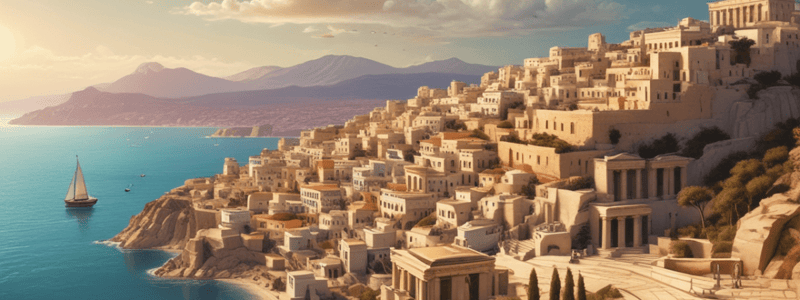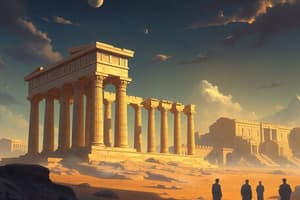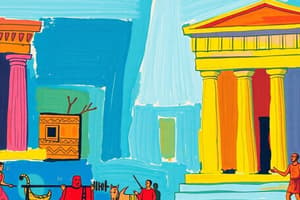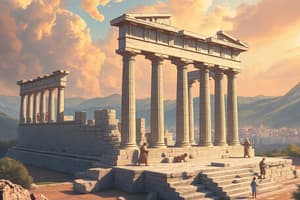Podcast
Questions and Answers
What did Solon do to Ancient Athens?
What did Solon do to Ancient Athens?
- He united Athens with Sparta
- He established the Olympic games
- He codified the constitutional structure (correct)
- He colonized Sicily
What was one of the benefits of colonization for the city-states?
What was one of the benefits of colonization for the city-states?
- It reduced the importance of trade
- It increased the rivalry between city-states
- It made the city-states more united
- It reduced the agricultural stress on mainland Greece (correct)
What was the purpose of the cities built by Alexander the Great?
What was the purpose of the cities built by Alexander the Great?
- To protect the city-states from war
- To unite all of Greece under one rule
- To create posts for trading and cultural exchange (correct)
- To establish the Olympic games
What was one of the outcomes of the rivalry between Greek city-states?
What was one of the outcomes of the rivalry between Greek city-states?
What was the purpose of the Olympic games?
What was the purpose of the Olympic games?
What was the outcome of the Peloponnesian War?
What was the outcome of the Peloponnesian War?
What was the main difference between Egypt and the Greek city-states?
What was the main difference between Egypt and the Greek city-states?
What was the main similarity between Mesopotamia and Greece?
What was the main similarity between Mesopotamia and Greece?
What was the benefit of joining the Mesopotamian empire?
What was the benefit of joining the Mesopotamian empire?
What was the main reason for the extensive warfare of Egypt with its neighbors?
What was the main reason for the extensive warfare of Egypt with its neighbors?
Flashcards are hidden until you start studying
Study Notes
Greek City-States
- Emerged in the first centuries of recorded civilization, around 2000 BCE
- Did not coalesce into larger empires like their Sumerian and Egyptian neighbors
- Developed separate cultures due to mountainous geography of mainland Greece
- Hellenism was the essential connection between city-states, encompassing politics, religion, and culture
Ancient Greek City-States
- Also known as polis city-states, grew as separate ruling entities not answerable to any larger empire
- The concept of the polis is fundamental to modern understandings, influencing politics, police, and polite
- Most influential city-states emerged as trading centers before becoming hubs of trade and culture
- Each polis had unique ruling structures and ways of life, with geographic separation making them intensely self-reliant and proud of their unique cultures
Examples of Greek City-States
- Thebes: emerged in central Greece centuries before others, thrived during the Bronze Age and the Golden Age of the 500s BCE
- Athens: developed laws protecting democracy, a vigilantly guarded system, and was the second city-state to emerge
- Sparta: known for its constitution and military focus, contributed to the reputation of Greeks as intelligent warriors
- Corinth: enjoyed wealth due to its central trading location
- Delphi: had deep religious significance as the location of the Oracle and shrine to the god Apollo
Ancient Greek Cities
- The central city of each polis contained an agora for public buildings, including temples and government structures
- Agora was built on top of the acropolis or central hill, where leaders of each city-state met
- Pantheon of gods was essential to average citizens, who met in the agora to offer worship to their gods after purification rituals
- Market in the agora offered fountains for water and a marketplace for trading
Geographical Regions of Greek City-States
- Thebes developed in central Greece, surrounded by plains suitable for agriculture
- Athens was located on a peninsula walled in by mountains and the sea, giving it natural protection from invaders
- Sparta had mountainous protection, access to rivers for water, and the Laconian plain for agriculture
Government of Greek City-States
- No single form of government, with leadership structures varying between city-states
- Most had some form of oligarchy, where a few elites ruled over the rest
- Sparta had a council and two kings who controlled military matters
- Athens adopted democracy, or the rule of the people, a unique form of government in the ancient world
Features of Greek City-States
- Constitutions outlined powers of different governments, holding rulers accountable
- Colonialism was an ambition and necessity, with Greeks searching for new places to colonize
- Competition between city-states drove development, colonization, trade, and warfare
Studying That Suits You
Use AI to generate personalized quizzes and flashcards to suit your learning preferences.





